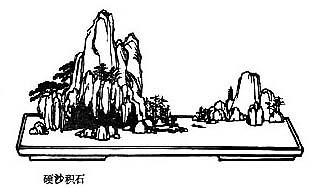孫
子
兵
法
Sun Zi 
 – L'Art de la guerre
– L'Art de la guerre
La stratégie chinoise ou comment s'informer, estimer, diviser, détourner, tromper, et vaincre « sans coup férir ». Tr. Amiot (fr) et Giles (en).
Des neufs sortes de terrain
Sunzi XI. 28.
Un bon général tire parti de tout, et il n'est en état de tirer parti de tout que parce qu'il fait toutes ses opérations avec le plus grand secret, qu'il sait conserver son sang-froid, et qu'il gouverne avec droiture, de telle sorte néanmoins que son armée a sans cesse les oreilles trompées et les yeux fascinés. Il sait si bien que ses troupes ne savent jamais ce qu'elles doivent faire, ni ce qu'on doit leur commander. Si les événements changent, il change de conduite ; si ses méthodes, ses systèmes ont des inconvénients, il les corrige toutes les fois qu'il le veut, et comme il le veut. Si ses propres gens ignorent ses desseins, comment les ennemis pourraient-ils les pénétrer ? Un habile général sait d'avance tout ce qu'il doit faire ; tout autre que lui doit l'ignorer absolument. Telle était la pratique de ceux de nos anciens guerriers qui se sont le plus distingués dans l'art sublime du gouvernement. Voulaient-ils prendre une ville d'assaut, ils n'en parlaient que lorsqu'ils étaient aux pieds des murs. Ils montaient les premiers, tout le monde les suivait ; et lorsqu'on était logé sur la muraille, ils faisaient rompre toutes les échelles. Étaient-ils bien avant dans les terres des alliés, ils redoublaient d'attention et de secret.
Amiot
It is the business of a general to be quiet and thus ensure secrecy; upright and just, and thus maintain order.
He must be able to mystify his officers and men by false reports and appearances,1 and thus keep them in total ignorance.2
By altering his arrangements and changing his plans,3 he keeps the enemy without definite knowledge.4 By shifting his camp and taking circuitous routes, he prevents the enemy from anticipating his purpose.
At the critical moment, the leader of an army acts like one who has climbed up a height and then kicks away the ladder behind him. He carries his men deep into hostile territory before he shows his hand.5
Giles XI.35-38.

L'Art de la guerre – Sun Zi XI. 28. – Chinois on/off – Français/English
Alias Sun Tzu, Sun Wu, Sun Tse, Sunzi Bingfa, Souen Tseu, Souen Wou, 孫武.
Le Canon des Poèmes, Les Entretiens, La Grande Étude, Le Juste Milieu, Les Trois Caractères, Le Livre des Mutations, De la Voie et la Vertu, 300 poèmes Tang, L'Art de la guerre, Trente-six stratagèmes
Bienvenue, aide, notes, introduction, table.
Index – Contact – Haut de page
